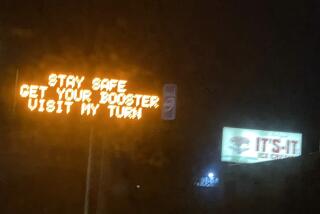FCC Launches Crackdown on Radio Show Obscenity : Targets Late-Hour ‘Indecency’
- Share via
WASHINGTON — The Federal Communications Commission, in a major review of on-the-air radio language, said today it will expand the definition of obscenity beyond the famous “seven dirty words” and will tighten enforcement of bans on indecent and offensive material.
The FCC’s decision, once published in the Federal Register, will apply to all U.S. radio stations. Officials said violators will be subject to fines and loss of licenses.
The FCC decision takes aim at areas of broadcasting formerly considered safe harbor by radio programmers--programs aired after 10 p.m. and material that merely avoids repeated use of obscene words.
The decision, expected to be at least as sweeping in its effect on the broadcast industry as the Supreme Court’s 1978 Pacifica ruling, responds to a series of complaints against radio stations, including non-commercial stations KPFK-FM in Los Angeles and KCSB-FM in Santa Barbara, and WYSP-FM in Philadelphia, a commercial station.
New York Show
Most of the complaints centered on New York radio personality Howard Stern, host of a morning talk show also carried on WYSP, and excerpts of a play, “Jerker,” broadcast in August, 1986, over KPFK, owned by the Pacifica Foundation.
The FCC said it will send warning letters to the three stations. In the future, all broadcasters will be held to stricter standards, officials said.
The case involving the broadcast of “Jerker,” a drama that the FCC said contains extended and graphic depictions of sexual acts, will be referred to the Justice Department for further investigation, the commission said. That program was aired after 10 p.m.
Sex, News, Music
Stern’s program--which mixes humorous sexual innuendo and double-entendre with news, music and traffic and weather reports--is in the 6 a.m. to 10 a.m. drive-time slot.
The warning to KCSB-FM in Santa Barbara, licensed to the University of California Board of Regents, concerned the airing of a rock song titled “Makin’ Bacon” between 10 p.m. and 11 p.m.
“What we are doing here today is to correct an altogether too narrow interpretation of decency,” said FCC Commissioner Dennis Patrick, expected to take over from Mark Fowler as chairman of the agency next week.
Broader Front
FCC general counsel Diane Killory said the agency will now “enforce the prohibition on indecent and obscene transmissions” in a broader fashion, along the lines of its original Pacifica decision in 1975.
Stations will be barred from using “patently offensive” material, not just the “seven dirty words”--made famous as part of a comedy routine by George Carlin.
The Supreme Court upheld the Pacifica case in 1978 in ruling that the FCC could curb obscene and profane language.
Killory said the change in policy is warranted because there is no way to restrict children from hearing such broadcasts.
More to Read
Sign up for Essential California
The most important California stories and recommendations in your inbox every morning.
You may occasionally receive promotional content from the Los Angeles Times.










